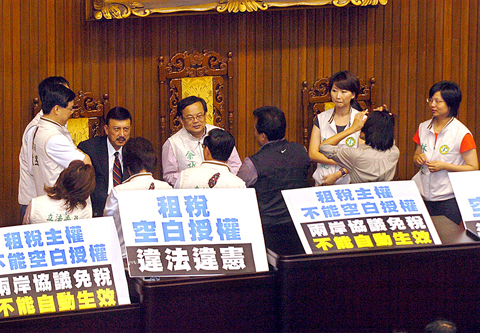The Democratic Progressive Party (DPP) said yesterday it opposed a proposal to allow Taiwanese businesses or individuals based in China to avoid paying taxes in Taiwan on income earned in China.
The legislature was scheduled to review an amendment to Article 25 of the Act Governing the Relations Between the Peoples of the Taiwan Area and the Mainland Area (兩岸人民關係條例) yesterday that would give the Executive Yuan the right to issue orders on cross-strait business taxation.
The KMT wants the bill passed to eliminate dual taxation on the cross-strait shipping sector.

PHOTO: FANG PIN-CHAO, TAIPEI TIMES
But the session was deadlocked over the issue yesterday morning after legislators failed to reach a consensus on the amendment. DPP legislators occupied the speaker’s podium in a bid to prevent the KMT from calling a vote on the bill.
DPP caucus whip Ker Chien-ming (柯建銘) threatened to “fight to the death” to block the bill.
At a press conference later in the day, KMT caucus whip Lin Yi-shih (林益世) criticized the DPP for paralyzing the plenary session: “We were supposed to deal with a number of bills today ... all bills should have been dealt with by democratic principles.”
Lin said the KMT might convene extraordinary sessions this summer to pass more bills.
“KMT legislators are more than happy to sacrifice our personal time if the legislature is unable to pass bills aimed at improving people’s livelihoods,” Lin said.
DPP spokesman Cheng Wen-tsang (鄭文燦) said the government wanted to ensure that Taiwanese and Chinese businesses were not taxed in both Taiwan and China, but it was going about it the wrong way. The government should amend the Business Tax Act (營業稅法) and the Income Tax Act (所得稅法), not the Act Governing the Relations Between the Peoples of the Taiwan Area and the Mainland Area, to give the Executive Yuan the right to issue orders on cross-strait tax, Cheng said.
He said the Constitution stipulates that changes to tax laws have to be regulated by law, and it would be unconstitutional if the government changed tax rules through administrative orders.
Cheng said Taipei and Beijing inked an agreement in April promising that Chinese and Taiwanese shipping companies would not be subject to dual taxation. The government wanted to expand the shipping pact to cover all businesses and was doing so in an underhanded manner, he said.
The government should not deprive the legislature of the right to approve laws by expanding its use of administrative orders, he said.
Meanwhile, DPP Legislator Chang Hwa-kuan (張花冠) accused the government of preparing to allow Chinese capital to be invested in Budai Harbor (布袋港), Chiayi County.
Association for Relations Across the Taiwan Strait Deputy Chairman Zheng Lizhong (鄭立中) visited the harbor with KMT Legislator Wong Chung-chun (翁重鈞), who represents Chiayi County. Chang said they discussed Chinese capital investment in Budai Harbor.
Cheng Wen-tsang said the party opposed allowing Chinese investment in airports, harbors and other infrastructure that has strategic significance because this would jeopardize national security.
He said Chinese investment in Taiwan’s airports and harbors was politically motivated.

Rainfall is expected to become more widespread and persistent across central and southern Taiwan over the next few days, with the effects of the weather patterns becoming most prominent between last night and tomorrow, the Central Weather Administration (CWA) said yesterday. Independent meteorologist Daniel Wu (吳德榮) said that based on the latest forecast models of the combination of a low-pressure system and southwesterly winds, rainfall and flooding are expected to continue in central and southern Taiwan from today to Sunday. The CWA also warned of flash floods, thunder and lightning, and strong gusts in these areas, as well as landslides and fallen

WAITING GAME: The US has so far only offered a ‘best rate tariff,’ which officials assume is about 15 percent, the same as Japan, a person familiar with the matter said Taiwan and the US have completed “technical consultations” regarding tariffs and a finalized rate is expected to be released soon, Executive Yuan spokeswoman Michelle Lee (李慧芝) told a news conference yesterday, as a 90-day pause on US President Donald Trump’s “reciprocal” tariffs is set to expire today. The two countries have reached a “certain degree of consensus” on issues such as tariffs, nontariff trade barriers, trade facilitation, supply chain resilience and economic security, Lee said. They also discussed opportunities for cooperation, investment and procurement, she said. A joint statement is still being negotiated and would be released once the US government has made

SOUTH CHINA SEA? The Philippine president spoke of adding more classrooms and power plants, while skipping tensions with China over disputed areas Philippine President Ferdinand Marcos Jr yesterday blasted “useless and crumbling” flood control projects in a state of the nation address that focused on domestic issues after a months-long feud with his vice president. Addressing a joint session of congress after days of rain that left at least 31 dead, Marcos repeated his recent warning that the nation faced a climate change-driven “new normal,” while pledging to investigate publicly funded projects that had failed. “Let’s not pretend, the people know that these projects can breed corruption. Kickbacks ... for the boys,” he said, citing houses that were “swept away” by the floods. “Someone has

‘CRUDE’: The potential countermeasure is in response to South Africa renaming Taiwan’s representative offices and the insistence that it move out of Pretoria Taiwan is considering banning exports of semiconductors to South Africa after the latter unilaterally downgraded and changed the names of Taiwan’s two representative offices, the Ministry of Foreign Affairs (MOFA) said yesterday. On Monday last week, the South African Department of International Relations and Cooperation unilaterally released a statement saying that, as of April 1, the Taipei Liaison Offices in Pretoria and Cape Town had been renamed the “Taipei Commercial Office in Johannesburg” and the “Taipei Commercial Office in Cape Town.” Citing UN General Assembly Resolution 2758, it said that South Africa “recognizes the People’s Republic of China (PRC) as the sole